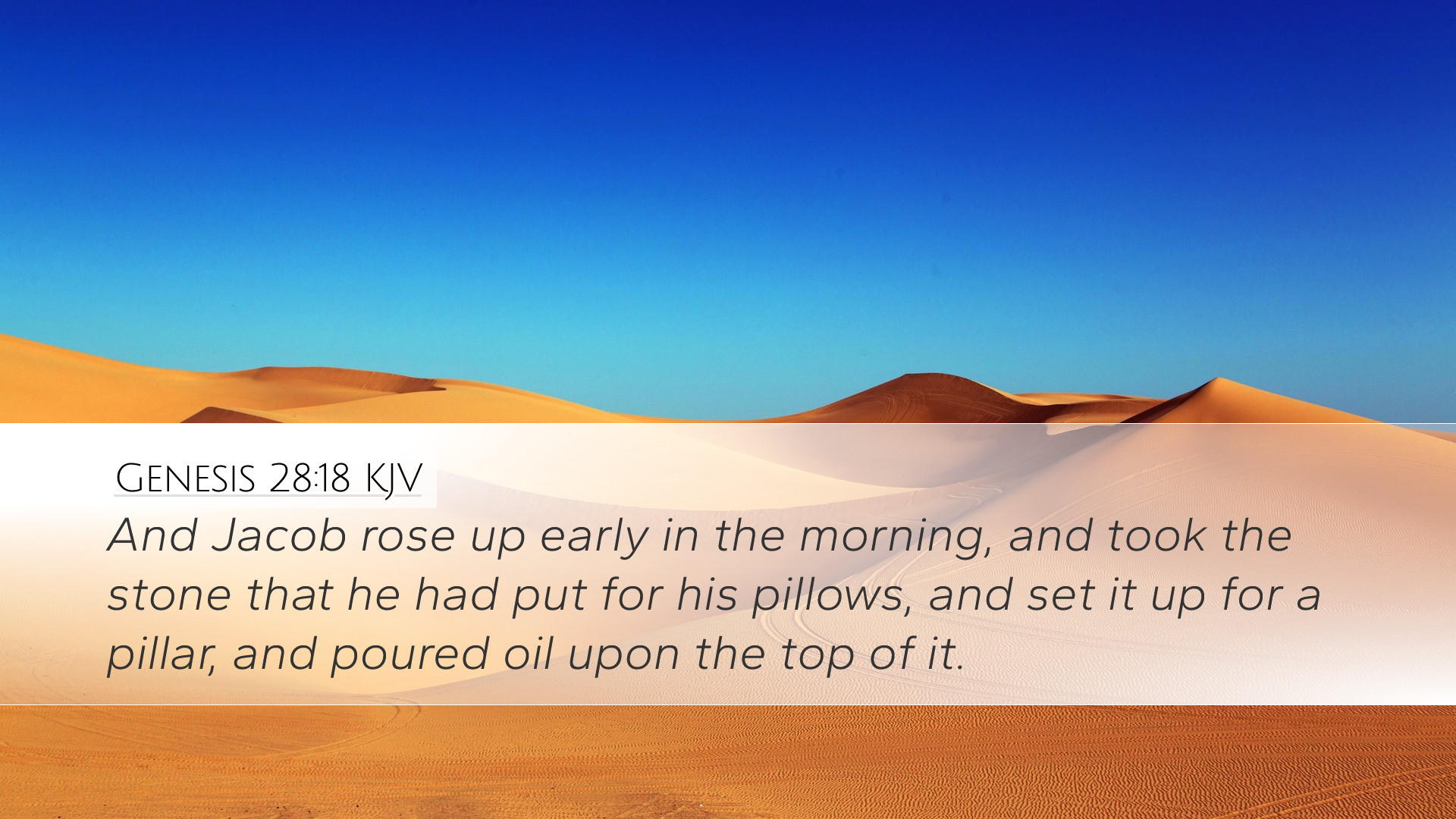Commentary on Genesis 28:18
Verse Text: "And Jacob rose up early in the morning, and took the stone that he had put for his pillows, and set it up for a pillar, and poured oil upon the top of it."
Introduction
This verse captures a significant moment in Jacob's life following his dream of a ladder reaching to heaven, where angels ascended and descended. The act of setting up the stone pillar is symbolic, reflecting Jacob's response to a divine revelation. This commentary synthesizes insights from Matthew Henry, Albert Barnes, and Adam Clarke, offering a theological lens through which pastors, students, and scholars can explore the profound implications of this moment.
Contextual Analysis
Jacob is on a journey, fleeing from Esau's wrath after having acquired his brother's birthright and blessing through deceit. His travels lead him to a place that he names Bethel, meaning "House of God." The dreams, pillars, and anointing with oil signify an encounter with God that will transform Jacob's understanding of divine presence and purpose.
Historical Background
The patriarchs’ journeys often are laden with theological significance. Jacob's experiences echo the broader theme of Israel's covenant relationship with God. Historical accounts establish that the stones used for pillows in the ancient Near East were common, yet Jacob's use of one as a pillar marks a clear point of sacramental significance.
Verse Breakdown
Let's delve deeper into the components of this verse:
- Early Rising: Jacob rose early signifies earnestness and eagerness in his newfound faith. His actions are a response to God's revelation (Henry).
- Taking the Stone: The stone that served as a pillow becomes a monument, indicating that ordinary elements can become sacred when touched by divine presence (Clarke).
- Pillar: Setting up the stone as a pillar demonstrates Jacob's desire to commemorate his divine encounter—a reminder of God's promise (Barnes).
- Poured Oil: Anointing with oil signifies consecration and the establishment of a holy place; it is an act of worship recognizing God's presence in that spot (Henry).
Theological Significance
The implications of Jacob's actions extend beyond individual experience; they establish foundational themes for understanding God’s relationship with humanity. The act of consecration highlights God's initiative in revealing Himself to flawed individuals, emphasizing grace and covenant.
Covenant Relationship
God’s promise to Jacob, which follows this act, underscores the continuity of the Abrahamic covenant. This moment signifies a turning point for Jacob, where his faith begins to mature, foreshadowing Israel's national identity as God's chosen people.
Symbolism of the Pillar
The stone pillar serves as a symbol of stability and divine presence. It foreshadows later practices in Israel, where stones were often used to memorialize significant spiritual events (Barnes). The pillar also implies that God is establishing a lasting testimony of His faithfulness.
Practical Implications for Believers
For modern readers, the significance of this passage can inspire contemplative reflection on how physical spaces are consecrated in our lives. Churches, altars, and places of prayer become significant not merely for their location but the divine encounters associated with them.
- Personal Reflection: Consider what 'stones' in your life might need to be consecrated as reminders of God’s faithfulness.
- Worship Practice: Integrate acts of sanctification in worship, like anointing spaces or elements symbolically to enrich the worship experience.
- Community Reminder: As believers gather, recognize the physical space as a testament to collective faith, where God's presence is encountered.
Conclusion
Genesis 28:18 serves as a powerful reminder of God’s continuous engagement with humanity through spaces, symbols, and acts of faith. For Jacob, this moment marked a definitive shift in his journey toward becoming Israel. For contemporary believers, the passage challenges us to recognize and commemorate the sites of divine encounter in our lives. Engaging with this scripture can prompt deeper understandings of our individual and collective histories with God, celebrating His promised presence in both sacred and ordinary contexts.


